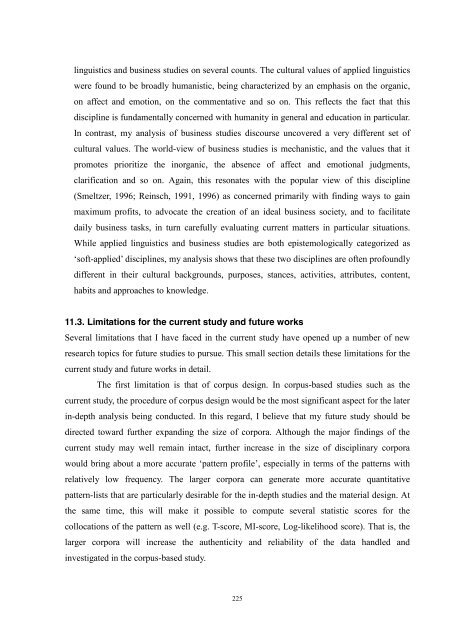Evaluative Meanings and Disciplinary Values - eTheses Repository ...
Evaluative Meanings and Disciplinary Values - eTheses Repository ...
Evaluative Meanings and Disciplinary Values - eTheses Repository ...
You also want an ePaper? Increase the reach of your titles
YUMPU automatically turns print PDFs into web optimized ePapers that Google loves.
linguistics <strong>and</strong> business studies on several counts. The cultural values of applied linguistics<br />
were found to be broadly humanistic, being characterized by an emphasis on the organic,<br />
on affect <strong>and</strong> emotion, on the commentative <strong>and</strong> so on. This reflects the fact that this<br />
discipline is fundamentally concerned with humanity in general <strong>and</strong> education in particular.<br />
In contrast, my analysis of business studies discourse uncovered a very different set of<br />
cultural values. The world-view of business studies is mechanistic, <strong>and</strong> the values that it<br />
promotes prioritize the inorganic, the absence of affect <strong>and</strong> emotional judgments,<br />
clarification <strong>and</strong> so on. Again, this resonates with the popular view of this discipline<br />
(Smeltzer, 1996; Reinsch, 1991, 1996) as concerned primarily with finding ways to gain<br />
maximum profits, to advocate the creation of an ideal business society, <strong>and</strong> to facilitate<br />
daily business tasks, in turn carefully evaluating current matters in particular situations.<br />
While applied linguistics <strong>and</strong> business studies are both epistemologically categorized as<br />
soft-applied disciplines, my analysis shows that these two disciplines are often profoundly<br />
different in their cultural backgrounds, purposes, stances, activities, attributes, content,<br />
habits <strong>and</strong> approaches to knowledge.<br />
11.3. Limitations for the current study <strong>and</strong> future works<br />
Several limitations that I have faced in the current study have opened up a number of new<br />
research topics for future studies to pursue. This small section details these limitations for the<br />
current study <strong>and</strong> future works in detail.<br />
The first limitation is that of corpus design. In corpus-based studies such as the<br />
current study, the procedure of corpus design would be the most significant aspect for the later<br />
in-depth analysis being conducted. In this regard, I believe that my future study should be<br />
directed toward further exp<strong>and</strong>ing the size of corpora. Although the major findings of the<br />
current study may well remain intact, further increase in the size of disciplinary corpora<br />
would bring about a more accurate pattern profile, especially in terms of the patterns with<br />
relatively low frequency. The larger corpora can generate more accurate quantitative<br />
pattern-lists that are particularly desirable for the in-depth studies <strong>and</strong> the material design. At<br />
the same time, this will make it possible to compute several statistic scores for the<br />
collocations of the pattern as well (e.g. T-score, MI-score, Log-likelihood score). That is, the<br />
larger corpora will increase the authenticity <strong>and</strong> reliability of the data h<strong>and</strong>led <strong>and</strong><br />
investigated in the corpus-based study.<br />
225
















